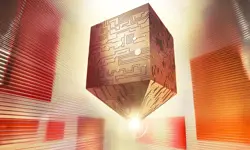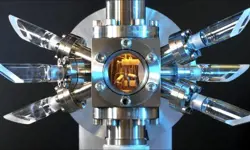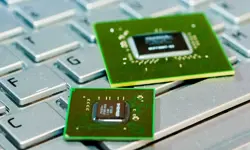
Q&A: Aurelia Brzezowska, cybersecurity expert
Why did you first become interested in science/engineering/STEM?
From early on, I was always playing around with technology. I had a knack for taking things apart and breaking them in the process, which meant that I learned a lot about technology and how it works. That drive to get things working also helped me learn programming as I was always eager to solve those pesky errors. That passion sparked further in my GCSEs and carried on to university where I found a love for cybersecurity. Strangely, I'd say the lack of women in STEM motivated me more to succeed as I wanted to become a role model that little me didn't have.

Aurelia (bottom row, far right) at the Bright Network Women in TEC event
How did you get to where you are now?
I took a traditional route through my education following GCSEs: A levels and later an undergraduate degree with a placement year. While it was tricky having studied at nonselective state schools in which most of my computing classes had few supplies, I persevered. I continued studying, applying myself and helping other students in my area to get ahead. I wouldn't be who I am today without my hardships and this is just the beginning for me. For anyone reading this doubting themselves ... you can do it!
In sixth form I also applied for and was awarded an Amazon Future Engineer bursary from the Royal Academy of Engineering. It is aimed at women studying computer science related degrees, who are from lower-income backgrounds to support them through their studies. It has provided me with an amazing and supportive community, mentorship from Amazon, yearly conferences, and access to opportunities I would not have had before. I'd recommend this scheme to every woman hoping to get into technology!
What has been your biggest achievement to date?
This would definitely be the creation of a UK-based women in tech network called Byte Queens. Some of the community I had met through the Amazon bursary worked together to create a greater network of women in tech around the UK. We've set up resource pages, a website, a dedicated community server and much more for our members. Our team works diligently to create content, share opportunities, highlight role models, create newsletters, and share the latest news in tech. It is open to any woman looking to get into technology and we have an exciting mentorship scheme coming up. My role is mainly community outreach based: I find role models, community members and work on projects such as our monthly newsletter. We're excited to see where this project goes and how many girls we can help achieve their dreams. This is just the beginning!
I love working with the team to inspire women to get into computing and highlighting amazing role models for them. The work everyone has put into it is truly amazing.

Aurelia (far left) at the Inspirational Youth Awards where she was a finalist for STEAM Personality of the Year 2024
What is your favourite thing about being an engineer?
Every day is different, especially where cybersecurity is concerned. Hackers are evolving their tactics on a daily basis and we have to keep up to stay ahead. You're always learning when it comes to tech and STEM and that's the best thing about it.
What does a typical day involve for you?
Juggling societies, community networks, work and STEM ambassadorship leads to a busy schedule! I work from Monday to Friday 9 to 5, researching recent cyber incidents, catching up with regulations and helping conduct data protection impact assessments. From there on, I attend lots of meetings and catch ups later in the evening to plan events for students in tech. Some days I go to teach students STEM subjects. No day is the same for me, so I have my handy calendar to help with that.
I'm currently completing a placement year at IKEA where I've been getting hands on with a lot of projects and vendors in terms of information security and data privacy. The role varied depending on the day and what needs to be done departmentally. This could be assessing cyber risks, looking at past breaches globally or conducting OneTrust assessments.
Quick-fire facts
Age:
20
Qualifications:
1.Computer science BSc with placement year (due to graduate with a first in 2026!)
2. Carbon Literacy Certified
3. Linux Essentials Certified (LPI)
Biggest engineering inspiration:
Judith Love Cohen. Her story will amaze you.
Most-used technology:
Amazon Web Services for my next certification!
Three words that describe you:
Driven, motivated, learner.
What would be your advice to young people looking to pursue a career in engineering?
Grab every opportunity that comes your way. You never know what may spark your love in that field. I had always thought that I wanted to become a software engineer until I found cloud computing and cybersecurity. If you're struggling in engineering, find a support system, the industry is tough and it's hard to make it alone. Sometimes you need someone who can push you towards your goals and motivate you to carry on doing what you love, even when it gets busy!
What’s next for you?
I will be looking to carry on my career in cloud computing, cybersecurity or information security and finish my degree in the meantime. It's hard to predict the future but I can definitely see the finish line for my undergraduate studies.
Keep up-to-date with Ingenia for free
SubscribeRelated content
Software & computer science

Pushing the barriers to model complex processes
In 2007, Imperial College London spinout Process Systems Enterprise Ltd won the MacRobert Award for its gPROMS (general-purpose PROcess Modelling System) software. Costas Pantelides and Mark Matzopoulos, two of the key people behind the success of gPROMS, tell how they created a way in which engineers can harness physics, chemistry and engineering knowledge within a framework that solves highly complex mathematical problems.

Compact atomic clocks
Over the last five decades, the passage of time has been defined by room-sized atomic clocks that are now stable to one second in 100 million years. Experts from the Time and Frequency Group and the past president of the Institute of Physics describe a new generation of miniature atomic clocks that promise the next revolution in timekeeping.

The rise and rise of GPUs
The technology used to bring 3D video games to the personal computer and to the mobile phone is to take on more computing duties. How have UK companies such as ARM and ImaginationTechnologies contributed to the movement?

EU clarifies the European parameters of data protection
The European Union’s General Data Protection Regulation, due for adoption this year, is intended to harmonise data protection laws across the EU. What are the engineering implications and legal ramifications of the new regulatory regime?
Other content from Ingenia
Quick read

- Environment & sustainability
- Opinion
A young engineer’s perspective on the good, the bad and the ugly of COP27

- Environment & sustainability
- Issue 95
How do we pay for net zero technologies?
Quick read

- Transport
- Mechanical
- How I got here
Electrifying trains and STEMAZING outreach

- Civil & structural
- Environment & sustainability
- Issue 95